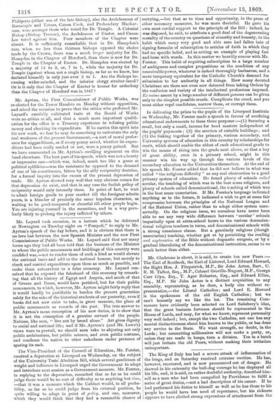Mr. Layard took occasion, in a lecture which he delivered
at Newington on Tuesday night on "Pompeii," to reply to Mr. Ayrton's speech of the day before, and it is obvious that there is no love lost between the new Spanish Minister and the new First Commissioner of Public Works. Mr. Layard said that not many hours ago they had all been told that the business of the Minister to whom the public monuments and buildings of this country were confided was,--not to render them of such a kind as would elevate the national taste and add to the national honour, but merely to check and control expenditure upon them as much as possible, and make them subservient to a false economy. Mr. Layard con- ceived that he exposed the falsehood of this economy by remark- ing that all the history of Egypt and Assyria, and much of that of Greece and Rome, would have perished, but for their public monuments, to which, however, Mr. Ayrton might fairly reply that it would hardly be justifiable to burden the present generation solely for the sake of the historical students of our posterity, even if books did not now exist to take, in great measure, the place of public monuments as records of the past. The true answer to Mr. Ayrton's mean conception of his new duties, is to show that it is not the conception of a genuine servant of the people. Nations, like men, " live not by bread alone." Art gives dignity to social and national life ; and if Mr. Ayrton's (and Mr. Lowe's) views were to prevail, we should soon take to abjuring not only public architecture, but public science, and even public costume, and condemn the nation to utter nakedness under pretence of sparing its cash.


































 Previous page
Previous page